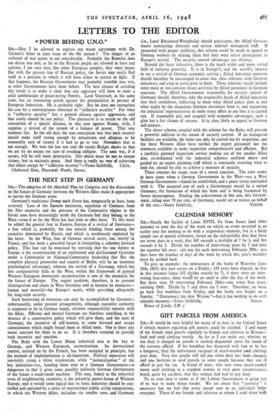THE NEXT STEP IN GERMANY
SIR,—The adoption of the Marshall Plan by Congress and the discussions on the future of Germany between the Western Allies make it appropriate to survey the German scene.
Germany's traditional• Draw- welt Osten has, temporarily at least, been reversed. Loss of the Eastern territories, expulsion of Germans from the Slav countries and the pressure of the Communist regime in the Soviet zone have increasingly made the Germans feel they belong to the West—even if so far the West has had little to offer them. To this must be added the general fear in Eastern Europe of a revival of Germany— a fear which is, probably, the one natural binding force among the countries dominated by Russia, and which is assiduously exploited by the latter. In the West, fear of German revival exists, too, mostly' in France, and has been a powerful factor in hampering a coherent forward policy. This fear can be exorcised by stressing that the one danger to Europe is the reconstitution of an embittered and disillusioned Germany under a Communist or National-Communist leadership (for this the complete physical possession and control of Berlin will be an immense psychological advantage), whereas the revival of a Germany, which has lost comparatively little in the West, within the framework of general Western European democratic reconstruction is one of the essentials for the future of Europe. The urgent problem, therefore, is to prevent disintegration and chaos in West Germany and to harness its resources— human and material—for Europe's needs, while providing adequately for long-term security.
Such harnessing of resources can only be accomplished by Germans ; unfortunately, under preient arrangements, although executive authority is supposed to be in German hands, ultimate responsibility remains with the Allies. Efficient and shrewd Germans are therefore unwilling, in the absence of a constructive policy which will give them, and the men of Germany, the incentive of self-interest, to conic forward and accept commitments which might brand them as Allied tools. Nor is there any moral sanction for them to do so. It is therefore essential to provide both incentive and sanction.
The Ruhr with the Lower Rhine industrial area is the key to German, and Western European, reconstruction. Its international control, insisted on by the French, has been accepted in principle, but the method of implementation is all-important. Political separation will inevitably create a bitter irredentism, while " nationalisation" of the key industries—i.e., handing them over to a German Government—is dangerous in that it gives some possibly militarist German Government of the future a ready-made machine. This area, linked.to the industrial areas of neighbouring countries, is the industrial power-house of Western Europe, and it would seem logical that its basic industries should be con- trolled and operated by a series of international public utility corporations, in which the Western Allies, including the smaller ones, and Germany
(i.e., Land Rheinland-Westphalia) should participate, the Allied Govern- ments nominating directors and certain selected managerial staff. If presented with proper publicity, this scheme could be made to appeal to German workers by making them feel they were active participants in Europe's revival. The security control advantages are obvious.
Beyond the basic industries, there is the much wider and more varied field of industry generally. It is in Europe's, and the world's, interest to see a revival of German economic activity ; Allied industrial concerns should therefore be encouraged to enter into close relations with German industries, and even to participate in them. These relations would include some more or less constant direct activities by Allied personnel in German concerns. The Allied Governments responsible for security control of Germany should, therefore, take the responsible heads of Allied industries into their confidence, indicating to them what Allied policy aims at and what might be the dangerous German deviations from it, and requesting the industries' representatives to make every effort to see that it is carried out. If reasonably put, and coupled with economic advantages, such a plan has a fair chance of success. It is, also, likely to appeal to German self-interest.
The above scheme, coupled with the scheme for the Ruhr, will provide a powerful addition to the means of security control. If no managerial . facilities are available, the latter can only be carried out by inspection, and the three Western Allies have neither the expert personnel nor the resources available to make inspection comprehensive and efficient. But a carefully planned inspection service making use of the smaller Allies also, co-ordinated with the industrial schemes outlined above and guided by an expert planning staff which is constantly assessing what to look for, should be able to achieve a measure of security.
There remains the major issue of a moral sanction. The time seems to have come when a German Government in the West—not a West German Government—should be established, and a peace treaty concluded with it. The accepted aim of such a Government would be a united Germany, the formation of which has been and is being frustrated by Soviet intransigence. Pending the achievement of this aim, this Govern- ment, ruling over 70 per cent. of Germany, would act as trustee on behalf






























 Previous page
Previous page